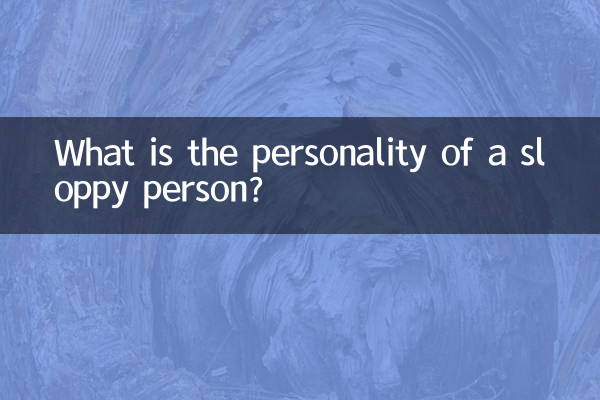What is the personality of a sloppy person?
In daily life, we always encounter some sloppy people. They may have slovenly appearance, messy rooms, and even casual living habits. So, what are the personality traits of sloppy people? This article will analyze the personality traits behind sloppiness from the perspective of psychology and behavior, combined with the hot topics and hot content on the Internet in the past 10 days.
1. Common personality traits of sloppy people

Sloppy people tend to exhibit some common psychological and behavioral characteristics. The following are some of the most discussed points across the internet:
| Character traits | Specific performance | psychological explanation |
|---|---|---|
| freedom of spontaneity | Not paying attention to details and having a loose pace of life | May pay more attention to inner feelings than external order |
| Strong creativity | Think divergently and don’t stick to routines | Chaotic environments may inspire creative thinking |
| tendency to procrastinate | Put off tidying up and cleaning | May be related to executive dysfunction |
| low anxiety | High tolerance for messy environments | Low need for order |
2. Hot discussion on the Internet: The relationship between sloppiness and personality
In the past 10 days, discussions about sloppy personalities on social platforms have mainly focused on the following hot topics:
| topic | Discussion popularity | Main point |
|---|---|---|
| Does being sloppy equal laziness? | high heat | 63% of netizens believe that sloppy ≠ lazy, which may be due to personality |
| The relationship between sloppiness and creativity | medium to high heat | Multiple studies show that some creative talents have chaotic working environments |
| How to deal with a sloppy partner | high heat | It became one of the top 10 emotional topics and sparked widespread discussion. |
3. Sloppy character from a psychological perspective
Psychologists point out that the following psychological motivations may be behind sloppy behavior:
1.priority difference: Sloppy people tend to place neatness at a lower priority and may be more focused on other things they consider more important.
2.Different cognitive styles: Some people are naturally less sensitive to cluttered environments, and their brains are less responsive to chaotic stimuli.
3.emotional factors: Some people express their resistance to control through sloppy behavior, or lack of cultivation of tidying habits in childhood.
4.Attention features: Sloppy behavior is more common in patients with ADHD (Attention Deficit Hyperactivity Disorder), which is related to their executive dysfunction.
4. Analysis of the advantages and disadvantages of a sloppy personality
| Advantages | Disadvantages |
|---|---|
| Unlimited thinking and more creativity | May affect social impression and career development |
| Less pressure and less likely to worry about small things | May cause health risks and life inconvenience |
| More flexible time allocation | Increased risk of losing important items |
5. How to get along with people who have a sloppy personality
1.Understand rather than accuse: Recognize that sloppiness may be a personality trait rather than an intentional behavior.
2.Establish common rules: When sharing a home or working together, negotiate a cleanliness standard that is acceptable to both parties.
3.Provide practical help: Such as providing storage tools or jointly developing an organization plan instead of simply complaining.
4.Focus on the good: Sloppy people often have outstanding talents in other areas, so focus more on their positive aspects.
6. Suggestions for changing sloppy habits
For those looking to change their sloppy habits, try the following:
1.Start with small goals: Organize a small area every day and gradually build a habit.
2.Use visualization tools: Such as comparing photos before and after sorting to enhance motivation.
3.Seek professional help: If the situation is serious, you can consult a psychological counselor or professional organizer.
4.Establish a reward system: Give yourself a small reward after completing your organizing goal.
Conclusion: Sloppiness, as a character expression, has its own psychological basis and behavioral pattern. Understanding this can help us look at our own or others' sloppy behavior more rationally and find a more suitable way to get along or change. Remember, neatness is only one aspect of living habits and should not be the only criterion for judging a person's worth.

check the details

check the details